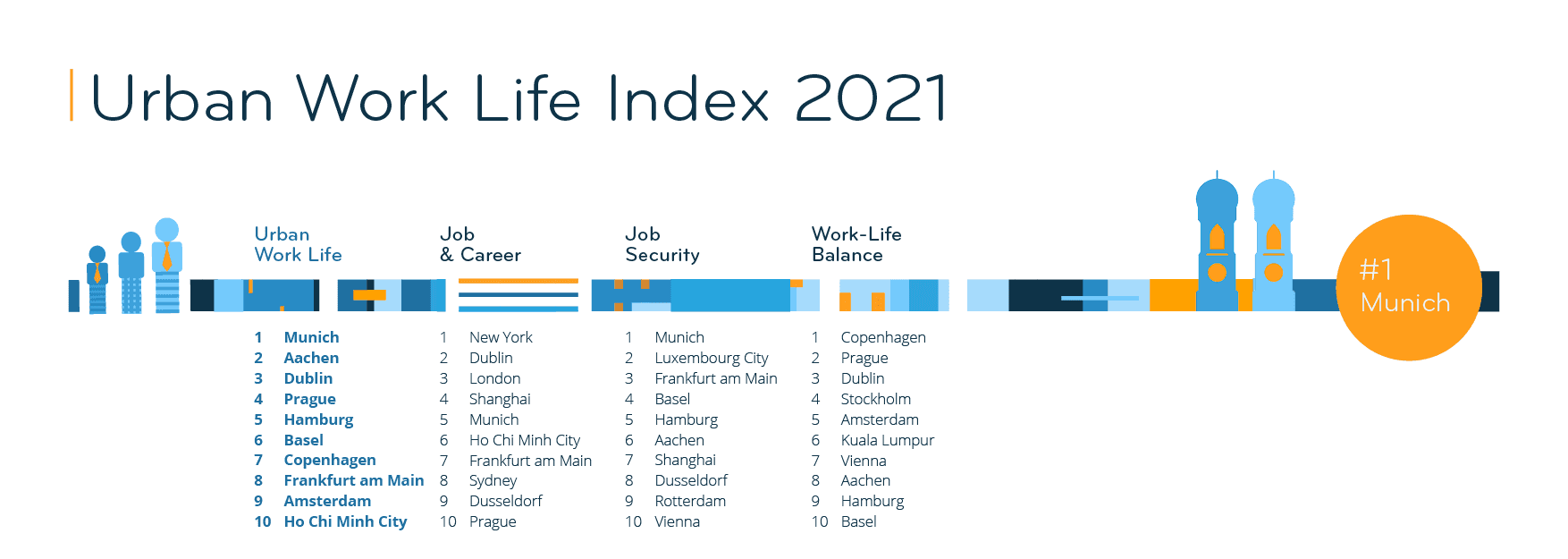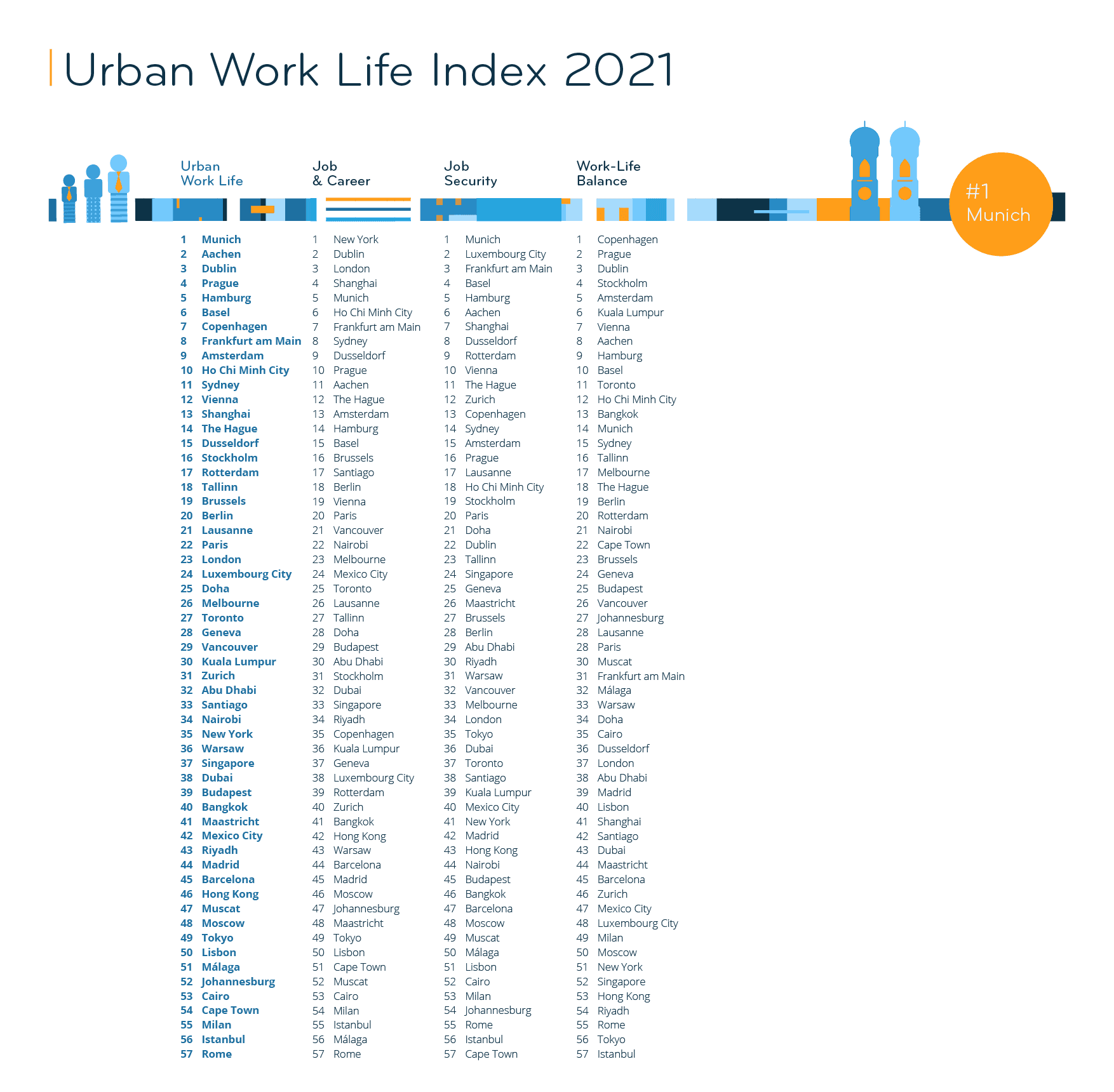All Work & No Play? Top Cities for Your Career
In the Urban Work Life Index, European cities dominate both the top and the bottom of the ranking.
- Expats in Munich (1st) appreciate the Bavarian capital for its strong economy and great career opportunities.
- With Aachen (2nd), another German city makes it into the top 3 of this index.
- Dublin (3rd) ranks 1st for both local career opportunities and job security.
- Nine out of the top 10 cities are located in Europe, with Ho Chi Minh City (10th) being the odd one out.
- Istanbul (56th) joins Milan (55th) and Rome (57th) in the bottom 3.
The Top 10

Methodology
The Urban Work Life Index is based on six rating factors, which are then combined into three subcategories: Job & Career, Job Security, and Work-Life Balance. Respondents got to rate these factors on a scale of one to seven, with a minimum sample size of 50 respondents per city required. In 2021, 57 cities meet this requirement.
Munich Is Not Only Attractive for Engineers
Since 2017, Munich has always ranked among the top 10 in the Urban Work Life Index. However, 2021 is the first year when it places among the top 3, even ranking first worldwide. The Bavarian capital is viewed favorably across the board. Expats are particularly happy with the state of the local economy: 94% give this factor a positive rating, with close to half (48%) even describing the economy as very good (vs. 62% and 20% globally). Only Basel receives a better result here.
A strong economy seems to go hand in hand with good job security (7th) and great local career opportunities (4th), at least in Munich. Over three-quarters of expats (76%) are satisfied with the former (vs. 61% globally), while 26% — twice the global average — are completely satisfied with their career prospects (vs. 13% globally). IT is the most common field of work by far (27% vs. 11% globally), though an above-average share of respondents also work in advertising, marketing & communication (13% vs. 5% globally) or manufacturing & engineering (9% vs. 7% globally).
Life in Munich is not “all work and no play” for expats, though: while the city receives its “worst” result in the Work-Life Balance Subcategory, it still ranks 14th out of 57 cities here. Around four in five respondents give the factors working hours (79%) and work-life balance (78%) a favorable rating (vs. 66% globally for each factor).
However, work does not stand out as a main motivator for relocating to Munich: slightly more than a third of expats (35%) cite career-related reasons for their move, which is in line with the global average of 36%.
Enjoying a Good Work-Life Balance in Aachen
With Aachen (2nd), another German city makes it into the top 3 of the Urban Work Life Index. Respondents there are just as happy as those in Munich, ranking Aachen sixth and eighth, respectively, in the Job Security and Work-Life Balance Subcategories. A Spanish respondent appreciates “how much Germans value the balance between life and work”. Regarding job security, over four in five expats in Aachen (81%) are satisfied with this factor, three in ten (30%) even very much so (vs. 61% and 24% globally).
An even higher share (85%) is happy with their job in general (vs. 68% globally). The local career opportunities, though, are not regarded as favorably as in Munich: Aachen receives its worst result in the index for this factor (22nd), with “just” 65% of respondents expressing their satisfaction. However, this is still 20 percentage points more than the global average of 45%!
Overall, Aachen has a higher-than-average share of respondents who moved to Germany because they found a job on their own (20% vs. 13% globally). The combined share of all expats with work-related reasons remains below average (27% vs. 36% globally), though. Education is the most commonly cited field of work in Aachen, with a share of 26% (vs. 12% globally), followed by the public sector (13% vs. 3% globally) and manufacturing & engineering (11% vs. 7% globally).
Look No Further Than Dublin for Your Career Abroad
Ranking 3rd out of 57 cities, Dublin makes it onto the podium in the Urban Work Life Index for the very first time. Expats rank the Irish capital first for both local career prospects and job security. “Ireland supports people’s growth,” says a Hungarian respondent in Dublin. Others seem to agree: around a third of respondents couldn’t be any happier with local career opportunities (33% vs. 13% globally) and job security (36% vs. 24% globally).
What’s more, about three-quarters each are happy with their working hours (74% vs. 66% globally) and work-life balance (75% vs. 66% globally). Dublin therefore ranks third in the Work- Life Balance Subcategory, just behind two other European capitals, Copenhagen (1st) and Prague (2nd).
However, Dublin gets rather average results for respondents’ overall job satisfaction (30th) and the state of the local economy (33rd). Still, two-thirds (67%) give the latter factor a good rating (vs. 62% globally).
Overall, 42% of respondents in Dublin moved to Ireland for work-related reasons (vs. 36% globally). Both international recruitments (16% vs. 11% globally) and expats finding a job on their own (19% vs. 13% globally) play an important role here. However, not one single respondent in Dublin moved there to open their own business (vs. 2% globally).
Trends in the Top 10
The predominance of European cities at the very top of the Urban Work Life Index also continues slightly further down the list: nine out of the top 10 cities are located in Europe, with Ho Chi Minh City (10th) being the odd one out. Expats in Vietnam’s largest city seem to love their job: close to nine in ten (88%) are generally satisfied with this factor, 20 percentage points more than the global average of 68%.
Hamburg (5th) and Frankfurt am Main (8th) join Munich and Aachen among the German cities in the top 10. All four rank among the top 15 in the Job Security and Job & Career Subcategories. While Munich, Aachen, and Hamburg also score top 10 places in the Work-Life Balance Subcategory, Frankfurt only lands in a mediocre 31st place. Expats in Frankfurt also spend more time at work — 42.6 hours a week compared to just 39.1 hours in Hamburg, for example, and 39.9 hours globally.
Prague (4th), Basel (6th), Copenhagen (7th), and Amsterdam (9th) make up the rest of the top 10 in the Urban Work Life Index. In all four cities, expats are particularly satisfied with their working hours: with three-quarters of respondents (75%) giving this factor a positive rating, Basel receives the “worst” result here (vs. 66% globally). Copenhagen and Prague even rank first and second worldwide, respectively, in the Work-Life Balance Subcategory. Expats in Basel, however, love the local economy — not one respondent judges this factor unfavorably (vs. 19% globally) — and close to two-thirds (66%) appreciate the career opportunities in Amsterdam (vs. 45% globally).
Few Changes among the Bottom 3
At the other end of the ranking, Turkey’s largest city, Istanbul (56th), joins Italian cities Milan (55th) and Rome (57th).
Coming last in the Urban Work Life Index 2021, Rome has always ranked at the very bottom since 2017, and it also places last in the overall Expat City Ranking 2021 (see Best & Worst Cities for Expats in 2021). It is the worst-rated city when it comes to overall job satisfaction, job security, and the local career opportunities. In fact, three in five expats in Rome (60%) rate the career prospects negatively (vs. 33% globally), and a quarter (25%) even say that they are very bad (vs. 10% globally).
Istanbul, which places second to last in the index, is the worst place to be with regard to work-life balance, at least according to expats. It ranks last in the respective subcategory, as well as for its two underlying factors. A third of respondents in Istanbul (33%) are dissatisfied with both their working hours (vs. 16% globally) and their work-life balance (vs. 17% globally). An even higher share — more than half the expats in Istanbul (52%) — rates the state of the local economy negatively, compared to a global average of just 19%. Close to one in five (19%) even give this factor the worst possible rating (vs. 4% globally).
With its 55th place in this index, Milan joins the Italian capital in the bottom 3. Close to half the expats in Milan (47%) rate the local career opportunities negatively (vs. 33% globally), and a quarter (25%) are dissatisfied with their working hours (vs. 16% globally). Another 38% are unhappy with the state of the local economy, twice the global average of 19%.
Trends in the Bottom 10
With Málaga (51st) and Lisbon (50th), there are two more Southern European cities in the bottom 10. In both cities, work-life balance seems to be the only positive aspect of expats’ working life: with 12% (Málaga) and 13% (Lisbon), respectively, respondents are less likely than the global average (17%) to give this factor a negative rating.
As has happened several times since 2017, South African cities Cape Town (54th) and Johannesburg (52nd) also end up among the bottom 10 in the Urban Work Life Index. When it comes to the Work-Life Balance Subcategory, they do not do too badly, coming in 22nd and 27th place, respectively. However, they lose out due to expats’ dissatisfaction with the state of the local economy, their job security, and the local career opportunities. Across these three factors, Cape Town’s 47th place for career options is, in fact, the best result. At the other end of the African continent, similar trends can be observed in Cairo (53rd), which joins the bottom 10 of this index.
Tokyo (49th) and Moscow (48th) complete the set. While expats in Tokyo are particularly dissatisfied with their job in general (52nd), respondents in the Russian capital give the state of the local economy a rather negative rating (51st). Neither city does well in the Work-Life Balance Subcategory, ranking 56th (Tokyo) and 50th (Moscow), respectively.
Full Ranking

Advertisement
Join InterNations
The community for expats worldwide
Download

